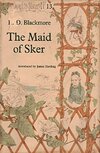R. D. Blackmore (1825–1900)
Author of Lorna Doone
About the Author
Image credit: Frontispiece Portrait from Lorna Doone, 1900 edition.
Series
Works by R. D. Blackmore
George Bowring - A Tale Of Cader Idris From "Slain By The Doones" By R. D. Blackmore (2015) 3 copies
Lorna Doone TV Tie (BBC) 2 copies
The Maid of Sker 1 copy
The Remarkable History of Sir Thomas Upmore, Bart., M.P., Formerly Known as "Tommy Upmore" Volume 1 (2015) 1 copy
Lorna Doone 1 copy
Politics and Poetics 1 copy
Associated Works
Romance Classics: Jane Eyre / Mansfield Park / Lorna Doone / Far from the Madding Crowd / Middlemarch / Agnes Grey (1928) — Contributor — 4 copies
90 Masterpieces You Must Read (Vol.1): Novels, Poetry, Plays, Short Stories, Essays, Psychology & Philosophy (2020) — Contributor — 1 copy
Tagged
Common Knowledge
- Legal name
- Blackmore, Richard Doddridge
- Birthdate
- 1825-06-07
- Date of death
- 1900-01-20
- Burial location
- Teddington Cemetery, London, England, UK
- Gender
- male
- Nationality
- UK
- Birthplace
- Longworth, Berkshire, England, UK
- Place of death
- London, England, UK
- Places of residence
- Longworth, Oxfordshire (then Berkshire), England, UK (then Berkshire)
Glamorganshire, Wales
Teddington, London, England, UK - Education
- Exeter College, Oxford
Hugh Squier's School, South Molton, Devonshire, UK
Kings School, Bruton, Somerset, UK
Blundell's School - Occupations
- novelist
teacher
private tutor
barrister
schoolmaster
market gardener - Short biography
- Richard Doddridge Blackmore (7 June 1825 – 20 January 1900), known as R. D. Blackmore, was one of the most famous English novelists of the second half of the nineteenth century. He won acclaim for vivid descriptions and personification of the countryside, sharing with Thomas Hardy a Western England background and a strong sense of regional setting in his works.
Blackmore, often referred to as the "Last Victorian", was a pioneer of the movement in fiction that continued with Robert Louis Stevenson and others. He has been described as "proud, shy, reticent, strong-willed, sweet-tempered, and self-centred." Apart from his novel Lorna Doone, which has enjoyed continuing popularity, his work has gone out of print.
Members
Reviews
Lists
Awards
You May Also Like
Associated Authors
Statistics
- Works
- 59
- Also by
- 9
- Members
- 3,827
- Popularity
- #6,628
- Rating
- 3.8
- Reviews
- 61
- ISBNs
- 300
- Languages
- 8
- Favorited
- 2
















